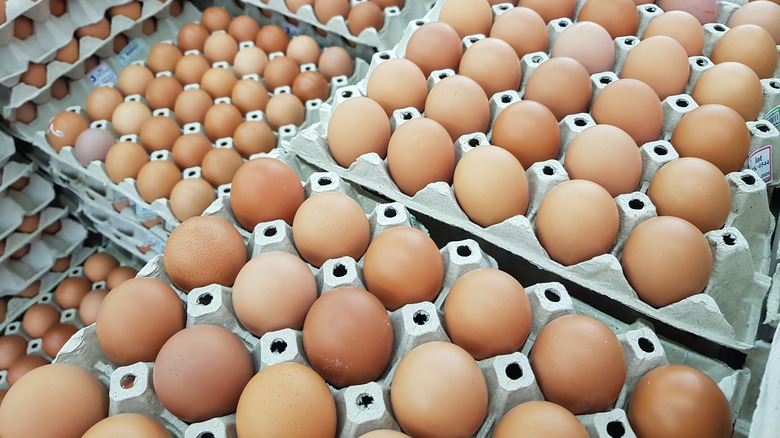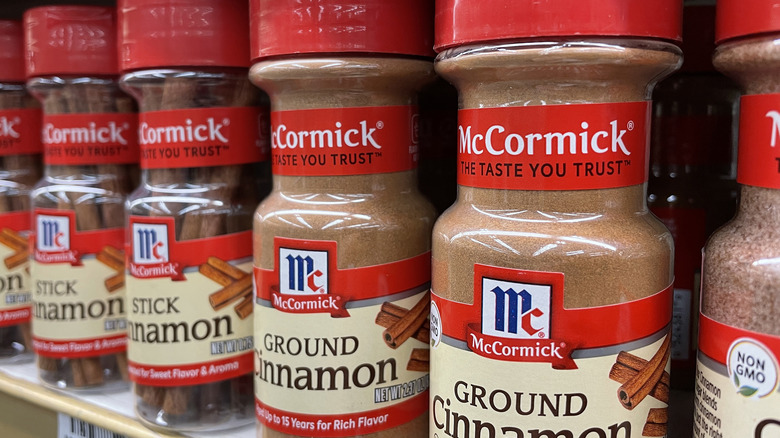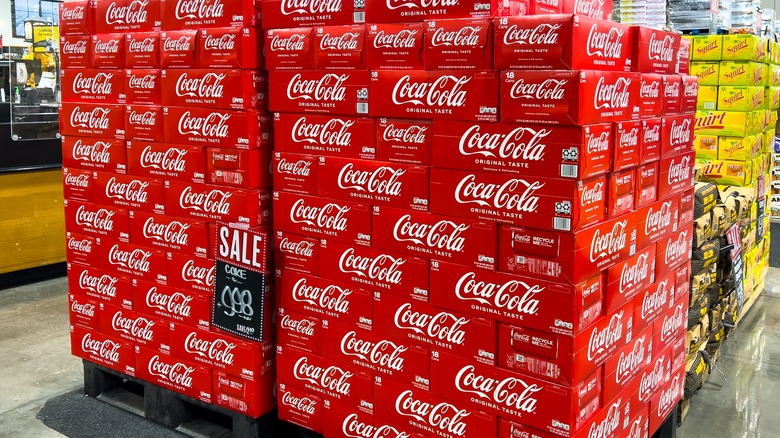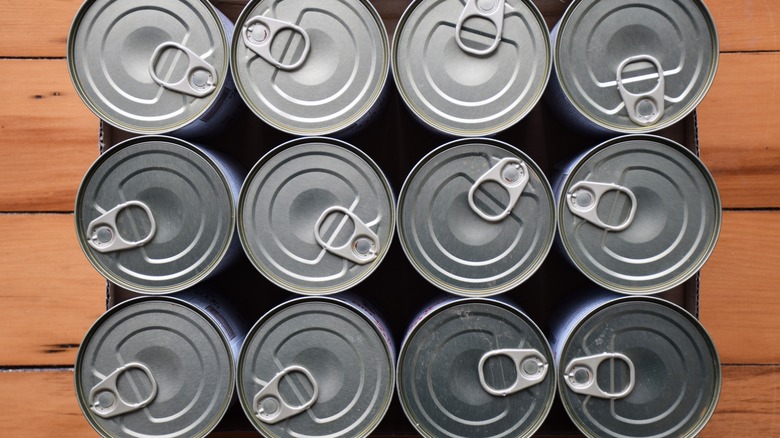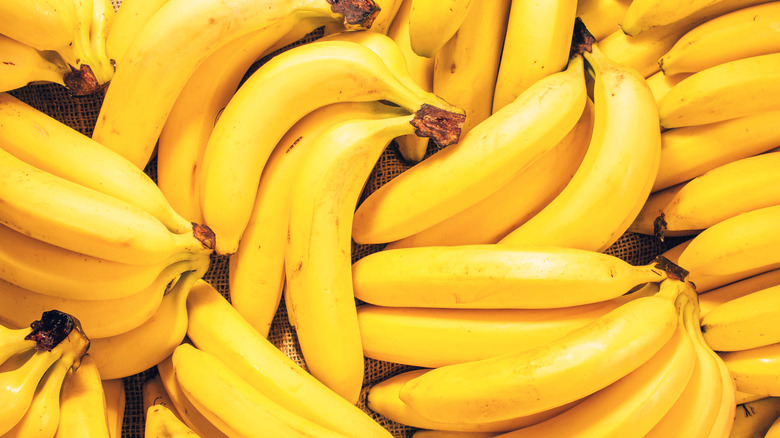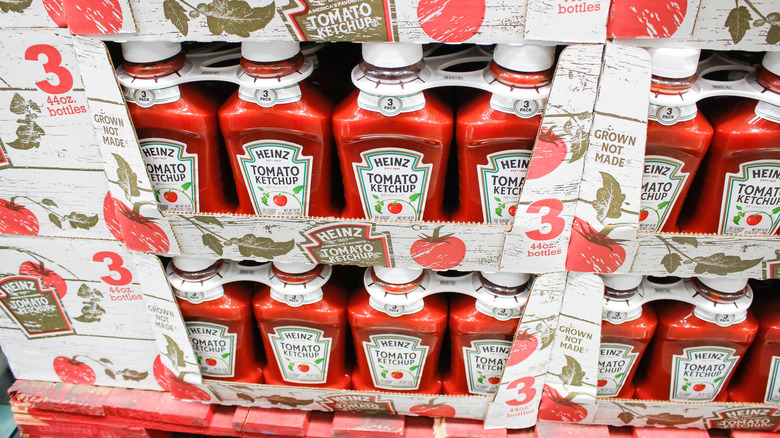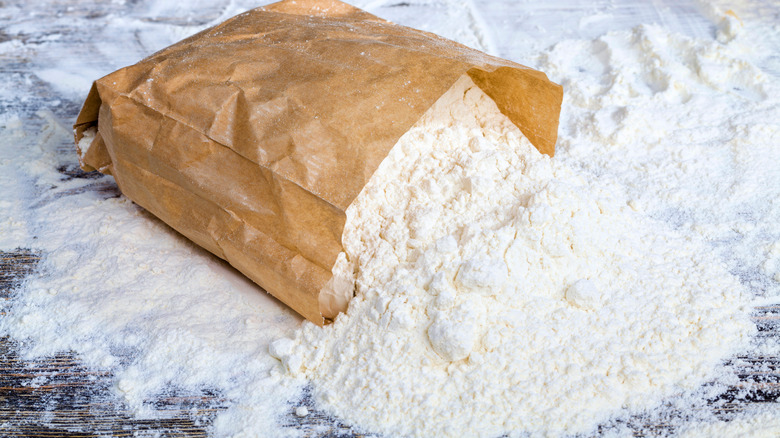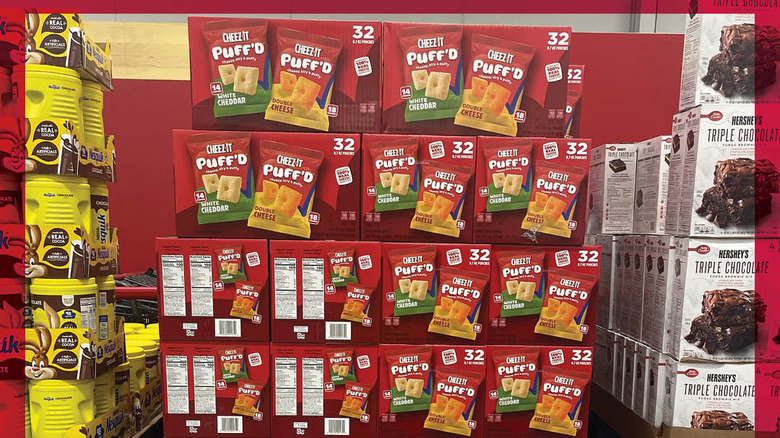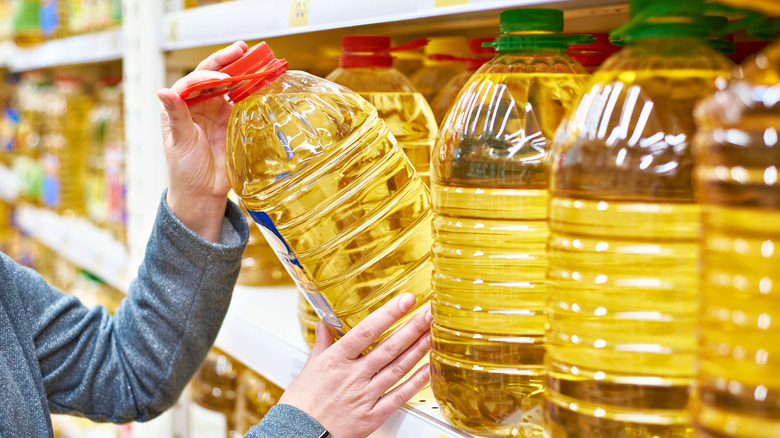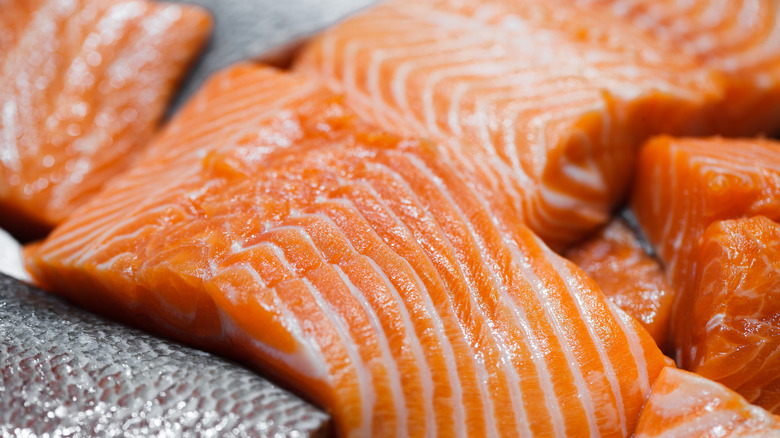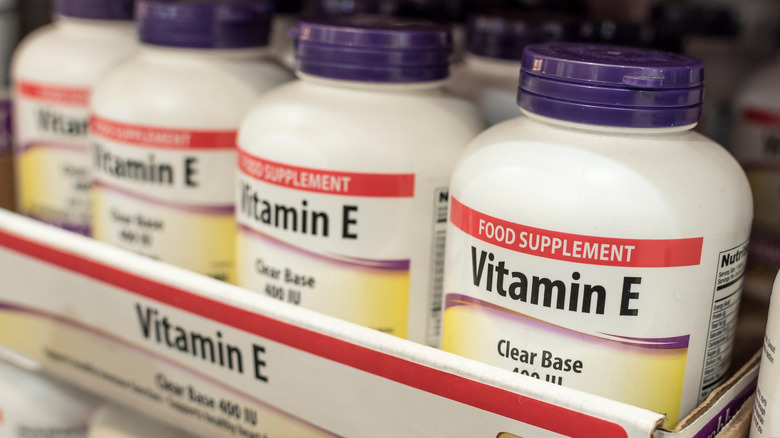BJ's Wholesale Club Products You Might Want To Skip Buying
It's said that everything is bigger in America — that includes grocery shopping. According to data from Kroger-owned 84.51°, nearly 75% of people in 2022 bought at least some grocery items in bulk, ranging from shelf-stable food items to household cleaners. Whether in-person or online, bulk-buying has become commonplace. In the Eastern half of the U.S., BJ's Wholesale Club is one of the biggest places to shop large. Originally founded in 1984 by Massachusetts-based department store Zayre, BJ's Wholesale Club warehouses have outlasted the original chain, boasting nearly 250 locations in 20 states as of April 2023.
By purchasing an annual membership, you can walk out of any location with giant pasta boxes, mega-cases of soda, and much more — you can even get items delivered to your door. Buying food in bulk has many potential benefits, such as paying less per unit, reducing packaging waste, stocking up for events, and preparing for emergencies. However, bigger isn't necessarily better, and some items aren't worth loading up on.
1. Eggs
Eggs are one of the oldest, most commonly found foods in history. They're used in everything from omelets to baked goods. But you should skip buying eggs from a warehouse. The USDA says that eggs can safely be stored in the refrigerator for three to five weeks, which is plenty for a carton of 12 from a regular grocery store. However, the smallest container of eggs we could find at BJ's Wholesale Club was a 24-count of Eggland's Best Cage Free Large White Eggs. On the other end of the spectrum, you have a 60-count of Wellsley Farms Large White Eggs that can take up multiple refrigerator shelves.
That is a lot of eggs. If it's just you at home, you'd have to eat two to three eggs a day to use 60 eggs in that three to five-week window — it's either that or end up with a bunch going rotten. While eggs have many health benefits in moderation, buying too many of them at once might not be the best idea — especially if you aren't able to finish them before they go bad.
2. Spices and Seasonings
If you're buying spices in bulk, you might end up with some plain meals after a while. Depending on the seasoning, most dried herbs and spices have a shelf life of up to three years. While they don't go bad beyond this point, their overall quality starts to fade, which includes losing flavor and color. Unless you rarely use spices, you should be able to finish a small 2-ounce container from the store before its potency dims. Giant spice jars from BJ's Wholesale Club are another story.
For example, Wellsley Farms Ground Cayenne Red Pepper is sold in 17-ounce containers with a listed 365-day shelf life. Assuming the serving size is the same ¼-teaspoon as McCormick Ground Cayenne Red Pepper, that's more than 400 servings. In other words, you can feel the heat of cayenne pepper every day and still not use it up in time. The same goes for the huge bottles of granulated garlic, black peppercorns, thyme leaves and other bulk spices to avoid at BJ's Wholesale Club. Smaller quantities are the way to go if you want to get the most from your spices and avoid them weakening with age.
3. Cheese
The U.S. loves cheese — according to Statista, annual per-capita cheese consumption increased more than five pounds in the 2010s, with the average American eating 40.2 pounds in 2020. Still, there are several reasons to avoid buying cheese in bulk. Blocks of hard cheese last six months in the fridge unopened and up to four weeks once opened, according to Healthline. That works well for the 6 to 8-ounce blocks found at most grocery stores. A serving of cheddar cheese is 1 ounce, so you should use it up in plenty of time.
BJ's Wholesale Club cheese is another story. A block of their Wellsley Farms Sharp White Cheddar Cheese is 32 ounces — that's 2 pounds. You would need to eat more than one serving a day to use that up in four weeks, which means a lot of saturated fat and salt that can cause health problems.
Some cheeses, such as shredded cheddar, are sold in even larger quantities, exacerbating the potential for overconsumption and waste. And unlike some foods, cheese doesn't freeze well for long-term storage, often affecting the texture and flavor. Have we mentioned that soft cheeses like mozzarella and ricotta have a shelf life as short as seven days (Via Healthline)? Overall, the better way to stock up on cheese is to wait until it's on sale at the supermarket and then buy several smaller blocks.
4. Soda
Although soda consumption has declined in the U.S. over the last 25 years, IBISWorld reports the average American still drinks 42.9 gallons per year — the equivalent of more than a can a day. But even if you're above average in your consumption, you should skip the soda aisle at BJ's Wholesale Club. For starters, soda is often on sale at grocery stores, with many using it as a loss leader to draw people in. Passionate Penny Pincher notes many stores have regular sales such as buy two get one free or buy two get two free, making them a lot cheaper than the Coca-Cola 35-Pack at BJ's Wholesale Club.
Perhaps just as important is that wholesale clubs typically don't have as many soda options. The only Pepsi varieties listed for sale at BJ's Wholesale Club are regular Pepsi and Diet Pepsi. So if you're looking for Pepsi Zero Sugar, Pepsi Wild Cherry, Pepsi Mango, Pepsi Real Lime, or any other Pepsi drink, you're out of luck. They don't even have Diet Mountain Dew, just normal Mountain Dew. If you time your purchases right, buying soda at a grocery store will get you the exact soda you want and a better price to boot.
5. Dairy-Based Dips and Hummus
Dips are a great way to jazz up chips, crackers, and vegetables. That is, they are if you use them up before they spoil. The longest-lasting creamy dips can only be kept in the fridge for up to four weeks — and only one week after opening (Via Shelf Life Advice). Many dips are based on products such as sour cream, which means they go bad on a similar schedule.
That comes into play when you're shopping in bulk. A week isn't much time to use up the 28 servings in a container of Wellsley Farms Spinach Dip. Even if you're getting dip for a party, that's a big ask. And like many other dairy products, dips do not freeze well. Even New England Dairy admits the taste and texture often change after freezing and thawing, making it harder to use up huge containers
You'll run into the same problem with hummus. This spread also goes bad within seven days, according to Eating Well, which means eating more than four servings a day from a tub of Wellsley Farms Original Hummus. It has the same problems with the freezing process hurting the product, too. So we recommend buying the smaller containers that you know your household can get through in a week.
6. Canned and Jarred Foods
Non-perishable canned goods have long been considered one of the ultimate bulk buys, with consumers citing their long shelf-stable life and lower price tag. It's true that many canned goods are safe for years if stored correctly. But once the seal is broken, the timeline shortens dramatically, with the content's lifespan suddenly dropping to three to seven days, depending on the acid content (Via USDA). That isn't much time to use up, say, a 112-ounce jar of Bruce's Yams. That's 7 pounds of chopped sweet potatoes — you could feed all the in-laws and still have to throw some out.
Even if you can find multi-packs of more normal-sized cans, which greatly reduce food spoilage, there are other drawbacks to stocking up on canned goods at BJ's Wholesale Club. Although the food is safe to eat for years, certain vitamins such as A and C slowly fade away, and the texture and color may eventually break down. Many canned foods, such as soup and vegetables, are also high in salt, which is added both for flavoring and as a preservative. Look specifically for low-sodium labels so bulk-purchasing canned foods doesn't lead to high blood pressure, bloating, excessive thirst, and other symptoms of too much salt.
7. Fresh Produce
Consuming fresh fruits and vegetables is usually preferable to frozen or canned produce. The fresh versions are more flavorful with a better texture, particularly in-season. Also, we don't think we're the only ones who tend to forget about produce when it's tucked away in the freezer or the cupboard.
The downside, though, is that fresh produce has a short shelf life which is why you should avoid buying produce at BJ's Wholesale Club. The exact amount of time produce will last depends on the item and the storage method. While apples can last up to a month, other produce, like berries, expire in as little as a day (Via Unlock Food). Let's be honest: How likely are you to eat 3 pounds of bananas in just a few days? Or, for that matter, chomp down 2 pounds of tomatoes within a week?
Experts already say fresh produce leads to more food waste than frozen and canned produce — and waste as a whole is a big problem in the U.S., with 30 to 40% of food ending up in the garbage every year (Via USDA). Unless you're making a certain dish or hosting a gathering that calls for copious amounts of produce, buy amounts you know you'll use from the grocery store to avoid further waste.
8. Condiments and Dressings
Sauces, condiments, and dressings are popular pretty much everywhere. The North American market alone exceeded $36 billion in 2021 and is expected to continue growing by nearly 5% per year (Via Industry Arc). But just because you love ketchup, barbeque sauce, or ranch doesn't mean you should buy them in bulk. Like other products that are shelf-stable when initially packaged, the clock starts ticking once you open them. Some condiments like ketchup and mustard can last 6-12 months in the fridge once you open them. Meanwhile, Olives are down for the count in two weeks, according to the USDA.
Either way, that's not much time to use an industrial-sized condiment bottle or jar from BJ's Wholesale Club. Take their Heinz Tomato Ketchup three-pack of 44-ounce bottles. Just one of those bottles officially has 73 servings. Even if you have bigger servings like us, and even though an unopened bottle can keep for a few months past the expiration date according to Does It Go Bad, that's still a lot of cook-outs and parties. For a 128-ounce tub of Hellman's Extra-Heavy Real Mayonnaise — which contains more than 250 servings and lasts about two months in the fridge (Via USDA) — using it up is an even bigger challenge. Buying them in grocery store-sized bottles will save your condiment experience from going sour.
9. Flour
Bakers know the agony of opening the cupboard and not having enough flour for their favorite bread or cake. But does that mean you should buy flour in bulk? For most people, the answer is no. All-purpose flour has a shelf life of six to eight months when kept in the pantry (Via Healthline). It lasts longer in the fridge or freezer, but people typically have those appliances filled with other foodstuffs. Whole grain flours have an even shorter service life because the protective bran layer is removed, clocking in at one to three months, according to the Wholegrains Council.
Unless you're baking multiple times a week, that's probably not long enough to go through a warehouse-size bag of flour. A standard bag of Gold Medal Flour from BJ's Wholesale Club clocks in at 12 pounds. That's more than 45 cups of flour, based on the nutrition facts label — or almost 2 cups a week over six months. Bags of King Arthur Whole Wheat Flour aren't much smaller at 10 pounds, making it prohibitive that you'll find enough ways to use it all in time. The exception to this bulk-buy rule is specialty flour, such as gluten-free flour and almond flour, since the packages are generally much smaller, making them easier to use up.
10. Snack Foods
It's always good to keep a few snacks at home, but maybe not the giant BJ's Wholesale Club snack containers. Snack food shelf lives vary wildly, but some estimates have put chips at two or three months, granola bars at six to eight months, and nuts at 6 to 10 months (Via Vending How). If it's just one or two people eating from a 55-ounce tub of Wellsley Farms Pretzel Sticks, they'll likely go bad before finishing, no matter how much you love pretzels.
Individual-wrapped pouches or single-serving snacks are a better choice in terms of spoilage, but they're still a risk. Although most packaged foods are safe to eat after the expiration date, crackers and pretzels, for instance, can last up to three months past the best-by date. The USDA notes they may still go stale or change in flavor. In other words, just because something is safe doesn't mean it's good to eat.
Finally, there's also the distinct possibility you won't like the snack. Even industry standards like cheese puffs vary between manufacturers. If the BJ's Wholesale Club house brand doesn't sit well with your taste buds, then it's a wasted purchase. So think long and hard before buying that massive pretzel tub or that 60-pack of Wellsley Farms chewy granola bars — especially if the grocery store has clearance boxes.
11. Cooking Oil
Oils such as vegetable oil, olive oil, and corn oil can be used for everything from grilling beef to making dips and salad dressings. So it's tempting for cooking enthusiasts to stock up on their preferred oils. But while bulk-buying cooking oil is great for restaurants, it's not so much for single people or family homes.
Like many items on this list, being able to use up your cooking oil is a concern. A tablespoon is considered a normal serving size, which means a 5-quart bottle of Wellsley Farms Vegetable Oil from BJ's Wholesale Club contains 320 servings. Meanwhile, the USDA says vegetable and olive oils can safely be stored for four months after opening. And since various oils are best for different uses, you shouldn't also get one oil for everything, either.
We haven't even mentioned the hidden hazard of buying cooking oil in bulk: Dealing with unused oil. You can't just dump it down a sink or in the yard. Doing so will clog pipes and attract pests, according to Insider. Old oil needs to be thrown out in a sealed container or brought to a recycling center. The hassle of disposal is one more reason to walk past the cooking oil section.
12. Fish
Seafood is one of the world's healthiest meats, with omega-3 fatty acids, high-quality proteins, and other necessary nutrients. Sadly, buying it from BJ's Wholesale Club is a fishy choice for most people. Fish has a noticeably short shelf life, with the USDA recommending up to two days for fresh fish, four days after cooking, and up to eight months for frozen. After these periods, the flavor and texture deteriorate, especially if there's air in the packaging.
The NOAA reports the average American consumed 19.2 pounds of fish in 2019, which is less than six ounces per week. By comparison, each person devours 67 pounds of beef annually (Via USDA). So, while buying ground beef and steak from BJ's Wholesale Club is certainly a good deal, getting a 3-pound tray of Wellsley Farms Norwegian Salmon or a 5-pound bag of frozen Whiting Fillets is often a waste regardless of the quality.
Of course, if the country's fish appetite caught up to nutritionist recommendations, it would be another story. According to UPI, less than 15% of Americans eat as much fish and shellfish as they should. But until that day comes, high-frequency users — those who eat seafood at least three times a week — are the only ones who will benefit from bulk-buying.
13. Vitamins and Supplements
Though they're not technically a food item, vitamins are another thing you might want to reconsider buying at BJ's Wholesale Club. Many people take vitamins, minerals, and other supplements — in 2022, the Council for Responsible Nutrition found 75% of Americans take some form of dietary supplement, which ranges from multivitamins to specialty supplements like fiber and probiotics.
But even if you're among the large majority of users that take vitamins regularly, you should think twice before buying them at this store. Vitamins are a lot like spices and seasonings in that, while they don't expire as such, they eventually lose their potency. Hard tablets typically can sit on the shelf for about two years, but the time span is much shorter for gummies and chewables since they take on more moisture. What further complicates things is that the FDA doesn't mandate use-by dates for dietary supplements, though some manufacturers add them willingly.
As you might expect, the vitamin and supplement packages at BJ's Wholesale Club are massive, with some containing more than 400 doses. It could be difficult to take 400 tablets, particularly for supplements you don't take daily. If there is an expiration date on the bottle, do some backward math before purchasing to make sure you won't be throwing out a bunch.

